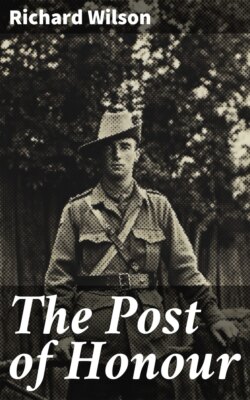Читать книгу The Post of Honour - Richard Wilson - Страница 9
На сайте Литреса книга снята с продажи.
THE SPIRIT OF SIR PHILIP SIDNEY
ОглавлениеTable of Contents
The old story of Sir Philip Sidney might well be written in letters of gold upon the wall of every school in the Empire. It will be remembered that he fought at Zutphen in Eastern Holland during the reign of Queen Elizabeth, and that he was mortally wounded in the thigh with a musket-ball. The immortal tale is told in the following words by his friend, Fulke Greville:—
“Being thirsty with excess of bleeding, he called for drink which was presently brought him; but as he was putting the bottle to his mouth, he saw a poor soldier carried along, who had eaten his last at the same feast, casting up his eyes at the bottle. Which Sir Philip perceiving, took it from his head before he drank, and delivered it to the poor man with these words, ‘Thy necessity is yet greater than mine.’ ”
Over and over again the brave fighters on the Western Front showed that the spirit of Sir Philip Sidney still lived and that it survived under conditions of horror and misery such as no soldier of Queen Elizabeth ever saw. Discipline and self-denial showed themselves in situations where the most severe judge might well forgive a man for thinking only of himself and his pressing and immediate needs. Here is one incident of the retirement from Mons.
Major Fawcett was in charge of two ambulance wagons and a water-cart, and saw with pity and anxiety that the poor wounded soldiers were suffering untold agonies owing to their long ride over rough and uneven ground. He therefore made up his mind to call a halt in order that the men might be refreshed with some beef-tea. The wagons were drawn up by the wayside, and the Major rode ahead to find some cottage or farm where the water might be boiled.
A few minutes after he disappeared from sight, a company of infantry came along. The men were weary, footsore, thirsty, and indescribably dirty; and as soon as they saw the water-carts drawn up by the side of the road, they crowded round them eager to quench their burning thirst.
Then an officer rode up to them and explained the situation. He said that there was very little water left in the carts and that it was badly needed for the wounded men in the two ambulances.
“I am thirsty myself,” he said, “and I’m awfully sorry for you fellows, but you see how it is; the wounded must come first.”
The reply was worthy of Sir Philip Sidney: “Quite right, sir; we didn’t know it was a hospital water-cart.” Then the thirsty men turned away and went on with their march.
There was the same Sidney spirit in Lieutenant Wynn of the Yorkshire Light Infantry, of whom one of his men wrote after the officer had died: “He was a gentleman and a soldier. The last day he was alive we had got a cup of tea in the trenches, and we asked him if he would have a drink. He said, ‘No, drink it yourselves: you are in want of it,’ And then with a smile, he added simply, ‘We are to hold these trenches to-day,’ ” Self-denial and pride in duty! These were the marks of British officers and men in that time of fiery trial.
